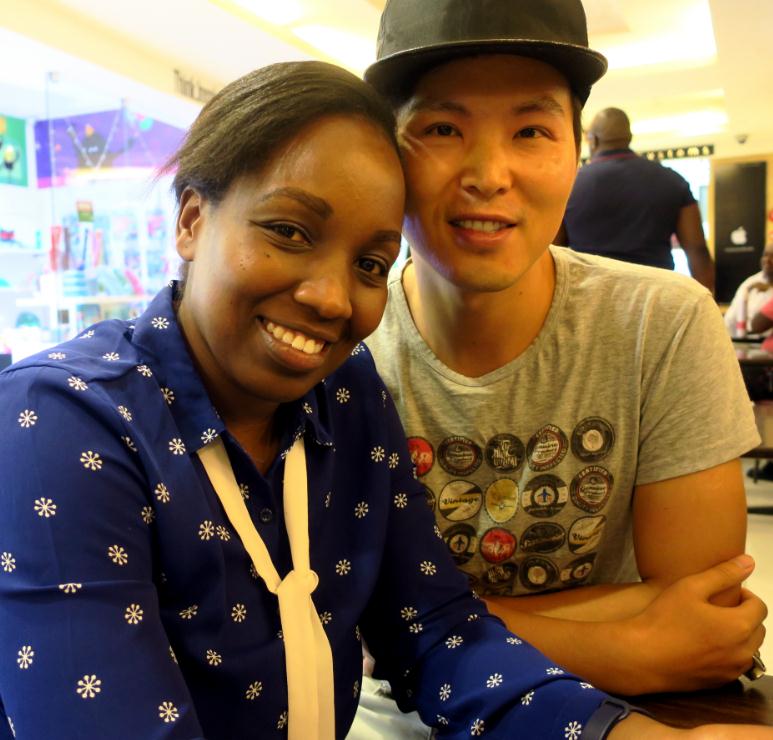Marriages bridge Chinese-Kenyan cultural differences


Three years ago, Ya Xing married Ruth Njeri before his friends and family in China. His peers considered him brave for starting a new life in Kenya but the ebullient entrepreneur, once a TV host, did not think so.
"I am in love," he said. "It might be complicated to marry into a new culture, but I think people think too much about it."
Ya, 40, was born in Luoyang, an industrial city in central China's Henan province. He met Njeri, 34, from Nairobi, Kenya, in a restaurant in Shanghai while she was studying under a Chinese government scholarship. At that time, they were both participating in the World Expo before meeting again in Beijing during the 60th anniversary of foreign students in China.
"It was fate," said Ya.
They are among the new faces defining Sino-African relations. People-to-people exchanges, riding on the back of education, commerce and diplomacy, have buoyed interracial marriages. such marriages has elicit widespread curiosity about these couples, who admit to responding to numerous requests from strangers to take picture with them.
Moreover, in China, these couples have large numbers of followers on social media platforms. Last year, Beijing Youth Daily reported that a Chinese-Cameroonian couple in Liaoning province earned $1,000 a month in advertising revenue from streaming their lives online.
Although earning no income from them, Ya and Njeri often welcome media crews from China into their home in Nairobi to document their lives. Moreover, they often travel to China to sing in cultural events while responding to a growing fan base on WeChat. They field questions on how they deal with cultural differences.
South African scholar David Monyae believes that such experiences may well pave the way for bettering Sino-African trade ties where culture and language continue to be the biggest impediments.
He has noted growing interest among African youths in understanding cultures. The African philosophy of "Ubuntu" is not far from Confucianism as both emphasize sharing and caring, according to Monyae.
"In Ubuntu, we believe that 'I am because of you', which means I cannot exist in your absence. Your well-being is good for me as well. For me to get peace in my life, I have to make sure that my neighbor is not hungry and there's peace in my neighbor's house," Monyae was quoted as saying.
Yet Ya faced challenges when he settled with Njeri in Nairobi. To earn a living, they opened a business that soon collapsed because the location and concept were not good. He had difficulties communicating with his in-laws despite successfully performing the traditional bride price ceremony known as ruracio.
"It was hard to fit in at first. But I wanted to understand her background, history and culture," he said.
Studies of interracial marriages have shown that education plays an important role in breaching cultural divides.
Interestingly, there has been a notable surge in the number of Africans pursuing higher studies in China. In 2017, at least 62,000 African students were enrolled in China, a 24 percent jump from 2016. There are more than 2,000 Kenyans alone studying in China, according to the Chinese Embassy in Nairobi.
The number of Chinese-Kenyan marriages has also started to creep up. The Kenyan government received 13 requests for the certificate of "no impediment" to marriage in 2018 compared to eight in 2017. This document is required for a Kenyan to marry anyone outside the country.
For those in China, the time to obtain the certificate has been drastically reduced due to improved logistics between the two countries.
Njeri finds Ya's diligence and persistence endearing. "Despite the difficulties in language and culture, Ya never gave up. He still looked for the positive aspects of my culture," she said.
And he found it. The talented musician said that in Kikuyu, Njeri's home district, people have traditional songs similar to those sung by the Dong people of southern China. "The tune and even the ululation are similar."































